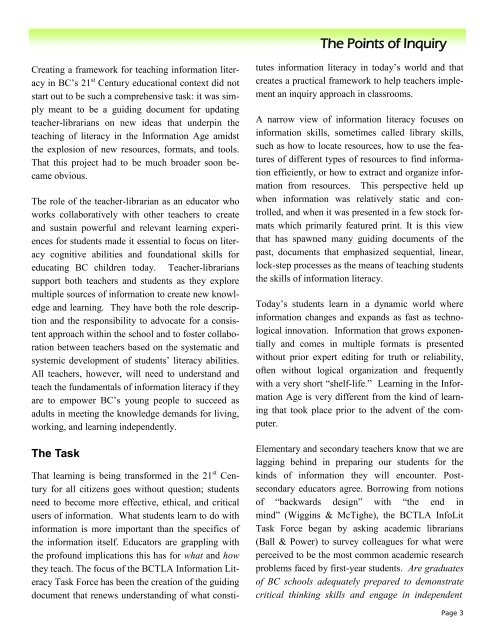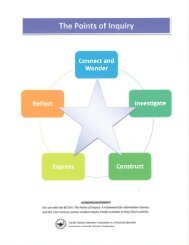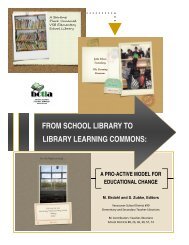PointsofInquiry
You also want an ePaper? Increase the reach of your titles
YUMPU automatically turns print PDFs into web optimized ePapers that Google loves.
The Points of Inquiry<br />
Creating a framework for teaching information literacy<br />
in BC’s 21 st Century educational context did not<br />
start out to be such a comprehensive task: it was simply<br />
meant to be a guiding document for updating<br />
teacher-librarians on new ideas that underpin the<br />
teaching of literacy in the Information Age amidst<br />
the explosion of new resources, formats, and tools.<br />
That this project had to be much broader soon became<br />
obvious.<br />
The role of the teacher-librarian as an educator who<br />
works collaboratively with other teachers to create<br />
and sustain powerful and relevant learning experiences<br />
for students made it essential to focus on literacy<br />
cognitive abilities and foundational skills for<br />
educating BC children today. Teacher-librarians<br />
support both teachers and students as they explore<br />
multiple sources of information to create new knowledge<br />
and learning. They have both the role description<br />
and the responsibility to advocate for a consistent<br />
approach within the school and to foster collaboration<br />
between teachers based on the systematic and<br />
systemic development of students’ literacy abilities.<br />
All teachers, however, will need to understand and<br />
teach the fundamentals of information literacy if they<br />
are to empower BC’s young people to succeed as<br />
adults in meeting the knowledge demands for living,<br />
working, and learning independently.<br />
The Task<br />
That learning is being transformed in the 21 st Century<br />
for all citizens goes without question; students<br />
need to become more effective, ethical, and critical<br />
users of information. What students learn to do with<br />
information is more important than the specifics of<br />
the information itself. Educators are grappling with<br />
the profound implications this has for what and how<br />
they teach. The focus of the BCTLA Information Literacy<br />
Task Force has been the creation of the guiding<br />
document that renews understanding of what constitutes<br />
information literacy in today’s world and that<br />
creates a practical framework to help teachers implement<br />
an inquiry approach in classrooms.<br />
A narrow view of information literacy focuses on<br />
information skills, sometimes called library skills,<br />
such as how to locate resources, how to use the features<br />
of different types of resources to find information<br />
efficiently, or how to extract and organize information<br />
from resources. This perspective held up<br />
when information was relatively static and controlled,<br />
and when it was presented in a few stock formats<br />
which primarily featured print. It is this view<br />
that has spawned many guiding documents of the<br />
past, documents that emphasized sequential, linear,<br />
lock-step processes as the means of teaching students<br />
the skills of information literacy.<br />
Today’s students learn in a dynamic world where<br />
information changes and expands as fast as technological<br />
innovation. Information that grows exponentially<br />
and comes in multiple formats is presented<br />
without prior expert editing for truth or reliability,<br />
often without logical organization and frequently<br />
with a very short “shelf-life.” Learning in the Information<br />
Age is very different from the kind of learning<br />
that took place prior to the advent of the computer.<br />
Elementary and secondary teachers know that we are<br />
lagging behind in preparing our students for the<br />
kinds of information they will encounter. Postsecondary<br />
educators agree. Borrowing from notions<br />
of “backwards design” with “the end in<br />
mind” (Wiggins & McTighe), the BCTLA InfoLit<br />
Task Force began by asking academic librarians<br />
(Ball & Power) to survey colleagues for what were<br />
perceived to be the most common academic research<br />
problems faced by first-year students. Are graduates<br />
of BC schools adequately prepared to demonstrate<br />
critical thinking skills and engage in independent<br />
Page 3






